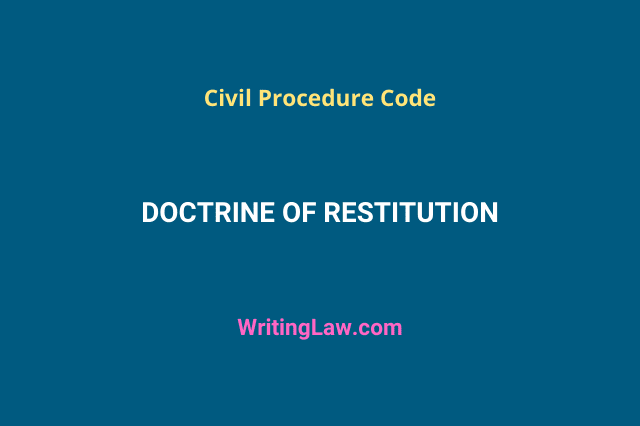
The term ‘restitution’ is not defined in the Civil Procedure Code. But it can be defined as restoring to one party the benefit that the other party received under a decree that was later found to be incorrect.
According to the Doctrine of Restitution, the law imposes an obligation on the party to the suit who received an unjust benefit from the erroneous decree to make restitution to the other party for what he has lost.
The obligation arises automatically upon the reversal or modification of the decree and entails the right to restitution for all that was done under the erroneous decree. In making the restitution, the court is bound to restore the parties, to the extent that they can be restored, to the position they were in at the time when the court, by its erroneous action, had displaced them from.
It is the court’s duty to see that if a person is harmed by a mistake of court, he should be restored to the position he would have occupied before for that mistake.
In Kavita Trehen vs Balsara Hygiene Products Ltd (1994), the court held that “the jurisdiction to make restitution is inherent in every court and can be exercised whenever justice of the case demands.”
The Doctrine of Restitution is based on the well-known maxim actus curiae neminem gravabit, which means that the act of court shall harm no one.
The doctrine is based on equitable principles.
Conditions for Application of the Doctrine of Restitution
Before restitution can be ordered, the three conditions listed below must be met:
- The restitution sought must be in relation to the reversed or varied decree or order.
- The party seeking restitution must be eligible to receive benefits under the reversing decree or order.
- The relief sought must be directly related to the reversal or variation of the decree or order.
Who May Apply for the Doctrine of Restitution?
Two conditions must be met for a person to be eligible to apply under section 144 of the Civil Procedure Code (CPC):
- He must be a party to the decree or order that is being varied or reversed.
- He must have become entitled to any benefit under the reversing decree or order, whether through restitution or otherwise.
Who May Grant Restitution?
An application for restitution must be made to the court that issued the decree or order.
Against Whom Restitution May Be Granted?
Under section 144 of the Civil Procedure Code, restitution can be ordered not only against the party to the litigation but also against his legal representative, such as pendente lite (during the pendency of a case). Section 144 of the Civil Procedure Code only applies to the parties or their representatives and not to sureties.
Limitation Period for Restitution
An application for execution of a decree under section 144 of the Civil Procedure Code is governed by Article 136 of the Limitation Act, 1963. The limitation period for such an application is 12 years, beginning with the date of the appellate decree or order.
Appeal Against Restitution
The determination of question under section 144 of the Civil Procedure Code has been expressly declared to be a decree under section 2 sub-clause 2 of CPC and is thus appealable.
Read Next:
1. What Is Doctrine of Exclusion of Hearsay Evidence
2. Restitution of Conjugal Rights Under the Hindu Marriage Act
3. What Is the Doctrine of Frustration or Impossibility in Contract Act
- What Is a Foreign Judgement and When It’s Not Binding in India - 26th July 2022
- What Are Second Appeals Under Civil Law - 23rd June 2022
- Civil Appeal as Per the Civil Procedure Code - 12th June 2022







